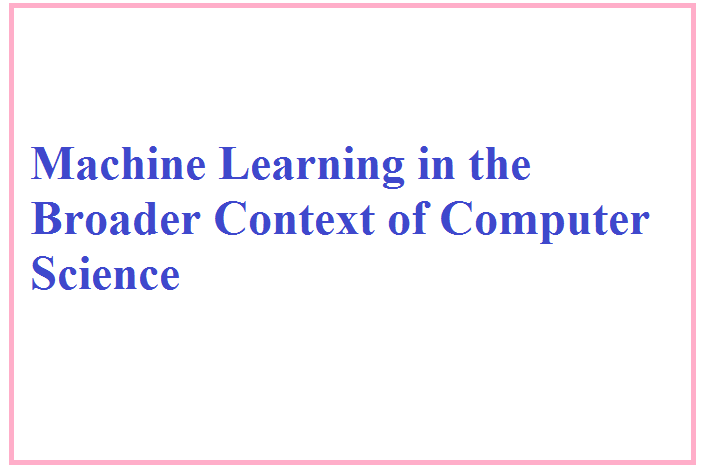Machine Learning In The Broader Context Of Computer Science
Category: MACHINELEARNING | 16th July 2025, Wednesday

1. Subfield Of Artificial Intelligence (AI)
Machine Learning Is A subset Of AI, Which Itself Is A Prominent Domain In Computer Science Aimed At Building Intelligent Systems. ML Focuses On Enabling Machines To learn From Data And Improve Over Time Without Being Explicitly Programmed. This Shifts The Traditional Programming Paradigm From rule-based Logic To data-driven Modeling.
- In Classical AI, Logic And Rules Are Manually Coded.
- In ML, Algorithms Automatically Find Patterns In Data To Make Predictions Or Decisions.
2. Connection To Core Areas Of Computer Science
a. Algorithms And Data Structures
-
ML Algorithms Like decision Trees, support Vector Machines, And neural Networks Are Built Using Foundational Computer Science Concepts.
-
Efficient data Structures (e.g., Graphs, Heaps, KD-trees) Are Crucial For Processing And Storing Training Data, Especially In Real-time Or Large-scale Systems.
b. Theory Of Computation
-
Theoretical Foundations, Such As computational Learning Theory (e.g., PAC Learning), Explore What Types Of Problems Are Learnable And The Computational Complexity Of Learning Algorithms.
-
ML Models Are Bounded By computational Limits—how Efficiently They Can Generalize From Data.
c. Software Engineering
-
Deploying ML Systems In Real-world Applications Requires modular, scalable, And maintainable Software Design.
-
Concepts Like version Control, testing, And continuous Integration Are Applied When Developing ML Pipelines And Applications.
d. Databases And Data Management
-
ML Relies Heavily On data Acquisition, storage, retrieval, And cleaning—all Of Which Fall Under Database Systems.
-
Integration With SQL, NoSQL, And Real-time Streaming Databases Allows ML Systems To Handle Big Data Efficiently.
e. Human-Computer Interaction (HCI)
-
ML Enhances user Interfaces, Such As Voice Assistants And Recommendation Systems.
-
Conversely, Designing ML Systems Requires Understanding How humans Interact With Models, Particularly In Explainability And Interpretability.
f. Computer Vision And Natural Language Processing
-
ML Is The Backbone Of These High-level Areas, Enabling Automatic Image Recognition, Speech Understanding, And Language Translation.
3. Mathematics And Statistics: A Bridge To Computer Science
Machine Learning Applies linear Algebra, calculus, probability, And optimization—mathematics Traditionally Outside Of Pure CS. However, ML Has Bridged This Gap, Integrating applied Statistics And Numerical Computation Into CS Curricula And Research.
4. Systems And Architecture
-
Modern ML Tasks Often Require parallel Computing, GPUs, distributed Systems (e.g., Spark, Hadoop), And cloud Computing Platforms.
-
Efficient Training Of Large-scale ML Models Involves compiler Optimization, memory Management, And hardware Acceleration—core Systems-level CS Knowledge.
5. Security And Ethics
-
Adversarial ML, data Privacy, bias Detection, And model Robustness Have Emerged As New Research Areas.
-
These Connect ML With cybersecurity, ethics, And policy, Showing The Interdisciplinary Nature Of ML Within CS.
6. The Scientific And Engineering Roles Of ML In CS
-
Scientific Role: Understanding Fundamental Principles Behind Learning Systems (theory, Guarantees, Explainability).
-
Engineering Role: Building Systems That scale, interact, And adapt In Dynamic Environments (e.g., Recommender Engines, Autonomous Systems).
Conclusion
Machine Learning Is not An Isolated Branch; It Is Deeply intertwined With Nearly All Subfields Of Computer Science. It Brings Together algorithmic Thinking, data Processing, system Design, And theory, Creating A Comprehensive Framework For intelligent Computation. For A Master's Student, Understanding ML Within This Broad Scope Helps Develop both Practical Skills And Theoretical Insights, Essential For Research Or Real-world Deployment.
Tags:
Machine Learning In The Broader Context Of Computer Science
